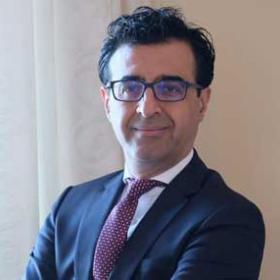
Hassan Talks Macron Visit to Iraq with Deutsche Welle Arabic
On September 3, EWI’s Vice President of Middle East and North Africa Program Kawa Hassan gave an interview to the Deutsche Welle Arabic program “Iraq Today” on the recent visit of the French President Emmanuel Macron to Baghdad.
Click here to listen to the interview on Deutsche Welle (in Arabic). Hassan’s comments begin at 05:16 and end at 34:00.
Read an English summary of Kawa Hassan’s remarks below.
Before heading to Baghdad from Beirut, Macron announced a “new initiative,” in collaboration with the UN, aiming to support and safeguard Iraqi sovereignty. However, little information, if any, is known about this initiative—this makes it very difficult to talk about its details. Macron wanted to visit Iraq in September last year, but was delayed due to the eruption of popular protests in Iraq in October 2019, and the overall political situation in the country.
The ambitious French president would like to play a more active political, economic and even military role in the Middle East. France’s historic role and interest in Lebanon is clear. His visit to Baghdad comes at a critical and sensitive time for Iraq, and the region in general, as the overall situation in Iraq remains very complex. The cabinet of Al-Kadhimi, Iraq’s Prime Minister, wants to restore state sovereignty and control militias.
The terrorist organization ISIS still poses a threat to Iraq and the region but is no longer as powerful as it was in its heyday [from 2014 to 2018]—ISIS ideology, however, is not dead. France has played, and still plays, an important role within the global coalition against ISIS. It is true that there are external interferences in Iraqi internal affairs and these interferences should end, but what is crucial to remember is that the biggest threat to the sovereignty of the Iraqi state is not ISIS, nor external players, but rather the corruption of the ruling elite and their lack of political will to implement true, not token, reforms.
Iraq is a battleground for regional conflicts and proxy wars between the U.S. and Iran. Turkey has been attacking PKK [Kurdistan Workers’ Party] bases in Iraqi Kurdistan. The question remains: why has Iraqi sovereignty been violated by external players? The post-2003 ruling class has failed in establishing a strong state that respects the rights and sovereignty of Iraqi citizens and the sovereignty of the state itself due to the fragmentation of the political landscape of Iraqi politics- some powerful political parties possess strong relations with Iran, while others have strong ties to Turkey and other states—all at the expense of the sovereignty of the Iraqi state.
I think President Macron primarily wanted to send a message to Turkey [and not Iran] when he stressed Iraqi sovereignty. Therefore, we need to place this French focus on the sovereignty of the Iraqi state within the context of the broader regional confrontation with Turkey in the Eastern Mediterranean, Libya and Lebanon. Having said that, the Iraqi government and political parties can benefit from this regional conflict and Macron’s ambition to assist Iraq and decrease external interference. While France can’t support Iraqi sovereignty directly at this time, Iraqi diplomacy can use French political ambitions and assistance to bolster Iraq’s diplomatic position in the security council.
At the moment, France is not in a position to confront American and Iranian influence in Iraq, but it can continue its important role in the war against ISIS and support economic reforms and reconstruction in ISIS liberated areas. However, this all depends on the willingness of the Iraqi ruling elite (and the Lebanse ruling class in the case of Lebanon) to implement long-overdue structural reforms. No power in the world, including France, can support Iraq if Iraqi leaders do not display a willingness to save Iraq [from systemic corruption they themselves created after 2003]. Currently, such political will is absent. However, the October Uprising of 2019 created a new reality—the Iraqi protest movement, despite being weakened [due to oppression and COVID-19], has become an important player in internal politics and to some extent, in the calculations of external players. Though the Al-Kadhmi cabinet has a plan and is serious in its attempts to implement reforms, intentions alone are not enough. The coming weeks and months will be crucial for Al-Kadhimi to deliver on his reform promises and restore security.
The Iraqi constitution recognizes the federal status of the Kurdistan Region—in this regard, I don’t see any threat to Iraqi sovereignty. But Baghdad and Erbil have serious disagreements on the distribution of the revenues of natural resources, regional budget and disputed territories. Both sides need to possess political will to solve these problems. It is worth noting that there are [at times] calls for decentralization and even federalism in Southern Iraq. Iraqi leaders should [heed popular calls for redistribution of political and economic powers] through establishment of a state based on real citizenship and respect for the diversity of Iraqi society regardless of religion, sect and ethnicity.
We don’t have enough information as to why Macron didn’t visit the Kurdistan Region; perhaps it was due to time constraints or political reasons. Macron did meet with the President of Kurdistan Region Nechirvan Barzani in Baghdad, however, as there is a history of good relations between France and the Kurdistan Region. But while many Kurds have a romantic view of French support for the Kurdistan region, at the end of the day, sober and strategic interests guide and define France’s Kurdish policy, not emotions. France supports a stable, federal Kurdistan Region within a united and stable Iraq.

